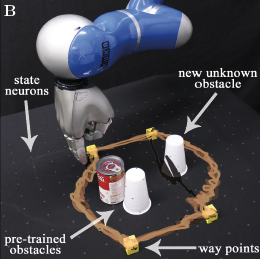Goal-based Open ended Autonomous Learning
Project Description
This project aims to develop a new paradigm to build open-ended learning robots called "Goal-based Open ended Autonomous Learning" (GOAL).
GOAL rests upon two key insights. First, to exhibit an autonomous open-ended learning process, robots should be able to self-generate goals, and hence tasks to practice. Second, new learning algorithms can leverage self-generated goals to dramatically accelerate skill learning.
The new paradigm will allow robots to acquire a large repertoire of flexible skills in conditions unforeseeable at design time with little human intervention, and then to exploit these skills to efficiently solve new user-defined tasks with no/little additional learning.
More information can be found on the website www.goal-robots.eu.

Publications
Daniel Tanneberg, Jan Peters und Elmar Rueckert, Intrinsic Motivation and Mental Replay enable Efficient Online Adaptation in Stochastic Recurrent Networks (2019), in: Neural Networks - Elsevier, 109(67-80)

- Research
- SonoBox: A Robotic Ultrasound System for Pediatric Forearm Fracture Diagnosis
- Robotics Laboratory (RobLab)
- OLRIM
- MIRANA
- Robotik auf der digitalen Weide
- KRIBL
- Ultrasound Guided Radiation Therapy
- Digitaler Superzwilling: Projekt TWIN-WIN
- - Finished Projects -
- High-Accuracy Head Tracking
- Neurological Modelling
- Modelling of Cardiac Motion
- Motion Compensation in Radiotherapy
- Navigation and Visualisation in Endovascular Aortic Repair (Nav EVAR)
- Autonome Elektrofahrzeuge als urbane Lieferanten
- Goal-based Open ended Autonomous Learning
- Transcranial Electrical Stimulation
- Treatment Planning
- Transcranial Magnetic Stimulation
- Navigation in Liver Surgery
- Stereotactic Micronavigation
- Surgical Microscope
- Interactive C-Arm
- OCT-based Neuro-Imaging
